4 Com PLC: Impact of OB on Individual and Team Performance
VerifiedAdded on 2021/01/02
|16
|5104
|406
Report
AI Summary
This report provides an in-depth analysis of organisational behaviour within the telecommunications company, 4 Com PLC. It explores the influence of organisational culture, politics, and power on individual and team performance, using Handy's model and Raven's and French model. The report evaluates content and process theories of motivation, including equity theory and Alderfer's ERG theory, and how these theories can be applied to achieve organisational goals. It also examines the characteristics of effective and ineffective teams, along with relevant team development theories. The report concludes by applying concepts and philosophies of organisational behaviour within an organisational context, offering insights into how these factors positively and negatively impact workplace behaviour and performance. The report provides justified recommendations for improving organisational effectiveness, emphasizing the importance of a healthy organisational culture and effective motivational strategies for the success of 4 Com PLC.
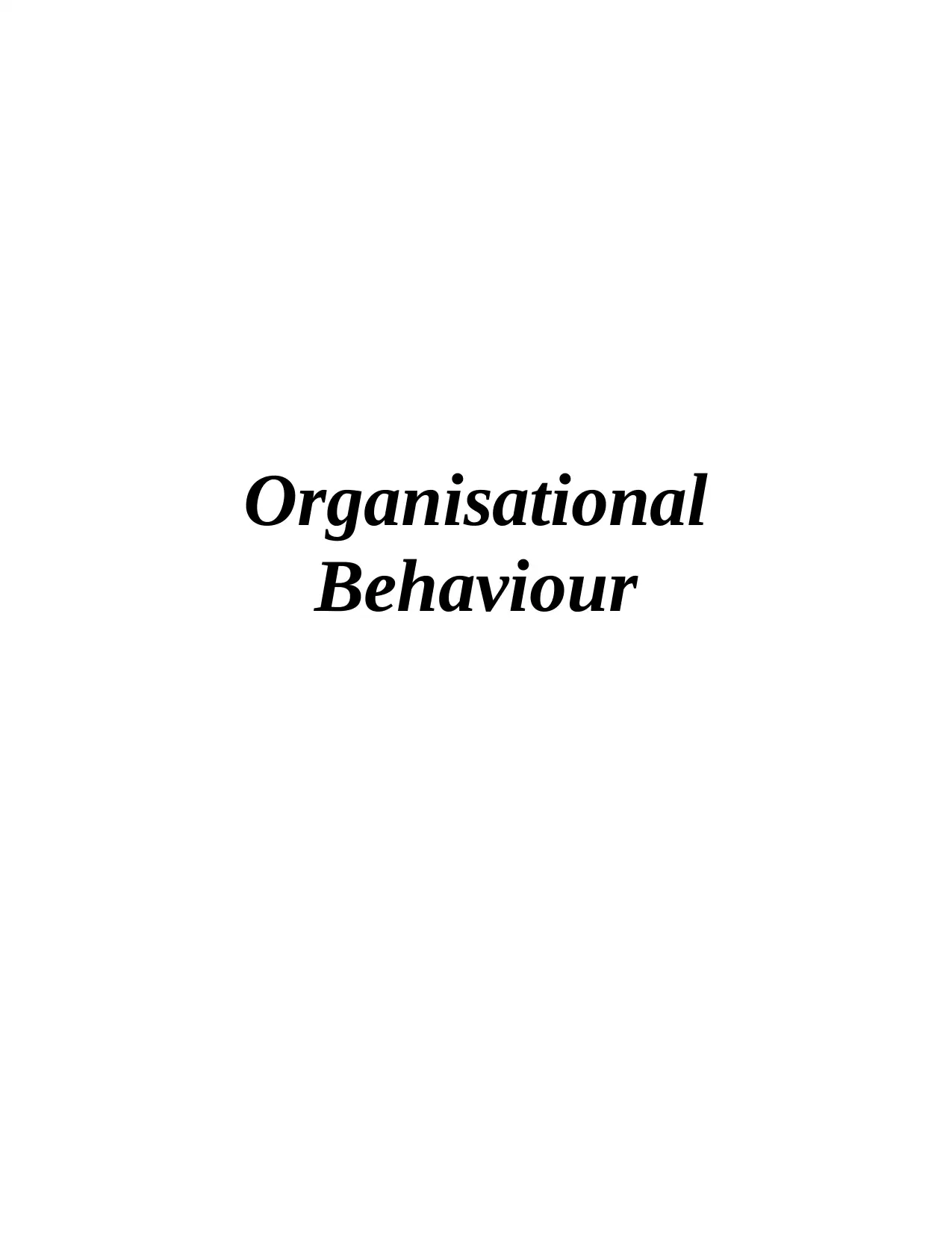
Organisational
Behaviour
Behaviour
Paraphrase This Document
Need a fresh take? Get an instant paraphrase of this document with our AI Paraphraser
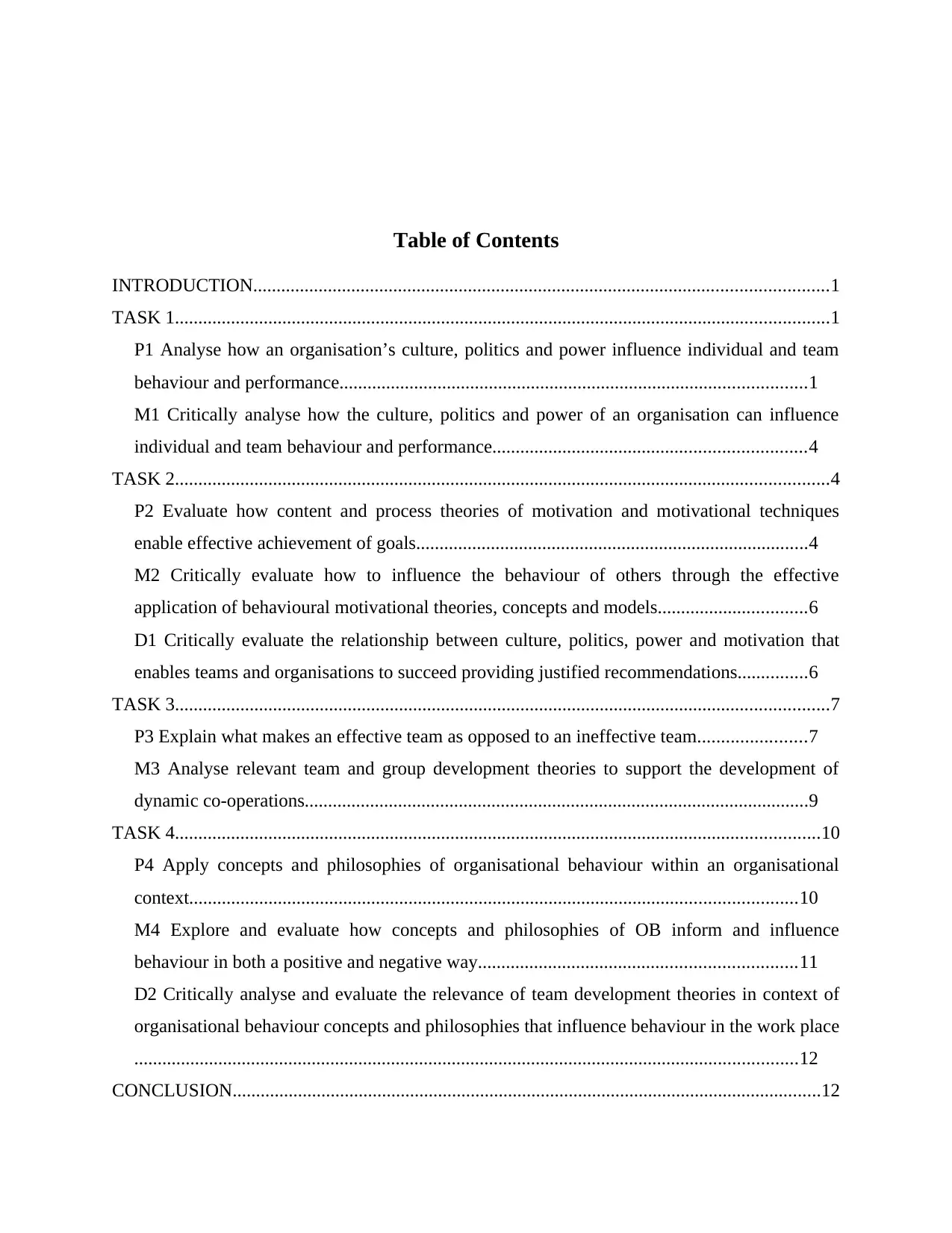
Table of Contents
INTRODUCTION...........................................................................................................................1
TASK 1............................................................................................................................................1
P1 Analyse how an organisation’s culture, politics and power influence individual and team
behaviour and performance....................................................................................................1
M1 Critically analyse how the culture, politics and power of an organisation can influence
individual and team behaviour and performance...................................................................4
TASK 2............................................................................................................................................4
P2 Evaluate how content and process theories of motivation and motivational techniques
enable effective achievement of goals....................................................................................4
M2 Critically evaluate how to influence the behaviour of others through the effective
application of behavioural motivational theories, concepts and models................................6
D1 Critically evaluate the relationship between culture, politics, power and motivation that
enables teams and organisations to succeed providing justified recommendations...............6
TASK 3............................................................................................................................................7
P3 Explain what makes an effective team as opposed to an ineffective team.......................7
M3 Analyse relevant team and group development theories to support the development of
dynamic co-operations............................................................................................................9
TASK 4..........................................................................................................................................10
P4 Apply concepts and philosophies of organisational behaviour within an organisational
context..................................................................................................................................10
M4 Explore and evaluate how concepts and philosophies of OB inform and influence
behaviour in both a positive and negative way....................................................................11
D2 Critically analyse and evaluate the relevance of team development theories in context of
organisational behaviour concepts and philosophies that influence behaviour in the work place
..............................................................................................................................................12
CONCLUSION..............................................................................................................................12
INTRODUCTION...........................................................................................................................1
TASK 1............................................................................................................................................1
P1 Analyse how an organisation’s culture, politics and power influence individual and team
behaviour and performance....................................................................................................1
M1 Critically analyse how the culture, politics and power of an organisation can influence
individual and team behaviour and performance...................................................................4
TASK 2............................................................................................................................................4
P2 Evaluate how content and process theories of motivation and motivational techniques
enable effective achievement of goals....................................................................................4
M2 Critically evaluate how to influence the behaviour of others through the effective
application of behavioural motivational theories, concepts and models................................6
D1 Critically evaluate the relationship between culture, politics, power and motivation that
enables teams and organisations to succeed providing justified recommendations...............6
TASK 3............................................................................................................................................7
P3 Explain what makes an effective team as opposed to an ineffective team.......................7
M3 Analyse relevant team and group development theories to support the development of
dynamic co-operations............................................................................................................9
TASK 4..........................................................................................................................................10
P4 Apply concepts and philosophies of organisational behaviour within an organisational
context..................................................................................................................................10
M4 Explore and evaluate how concepts and philosophies of OB inform and influence
behaviour in both a positive and negative way....................................................................11
D2 Critically analyse and evaluate the relevance of team development theories in context of
organisational behaviour concepts and philosophies that influence behaviour in the work place
..............................................................................................................................................12
CONCLUSION..............................................................................................................................12
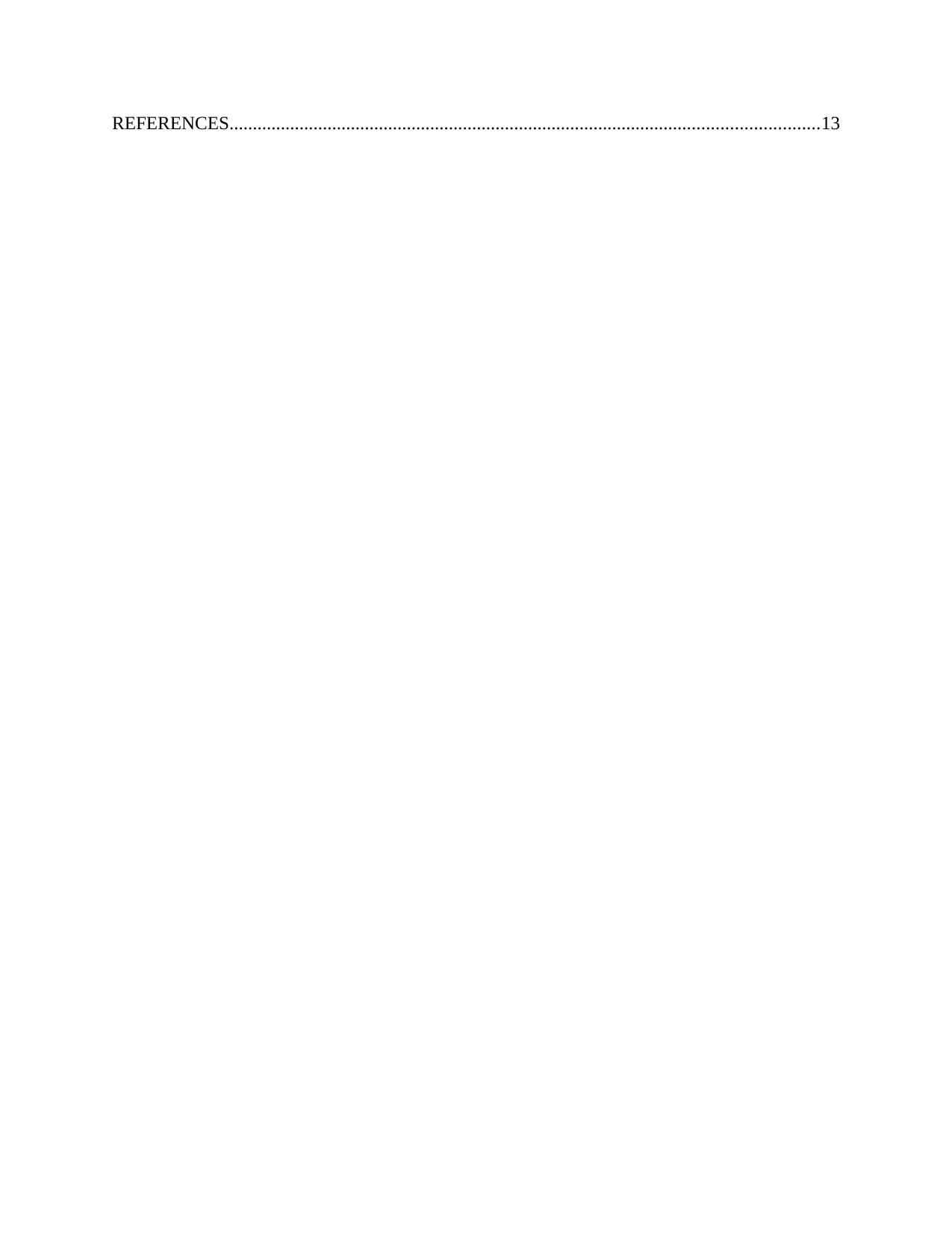
REFERENCES..............................................................................................................................13
⊘ This is a preview!⊘
Do you want full access?
Subscribe today to unlock all pages.

Trusted by 1+ million students worldwide
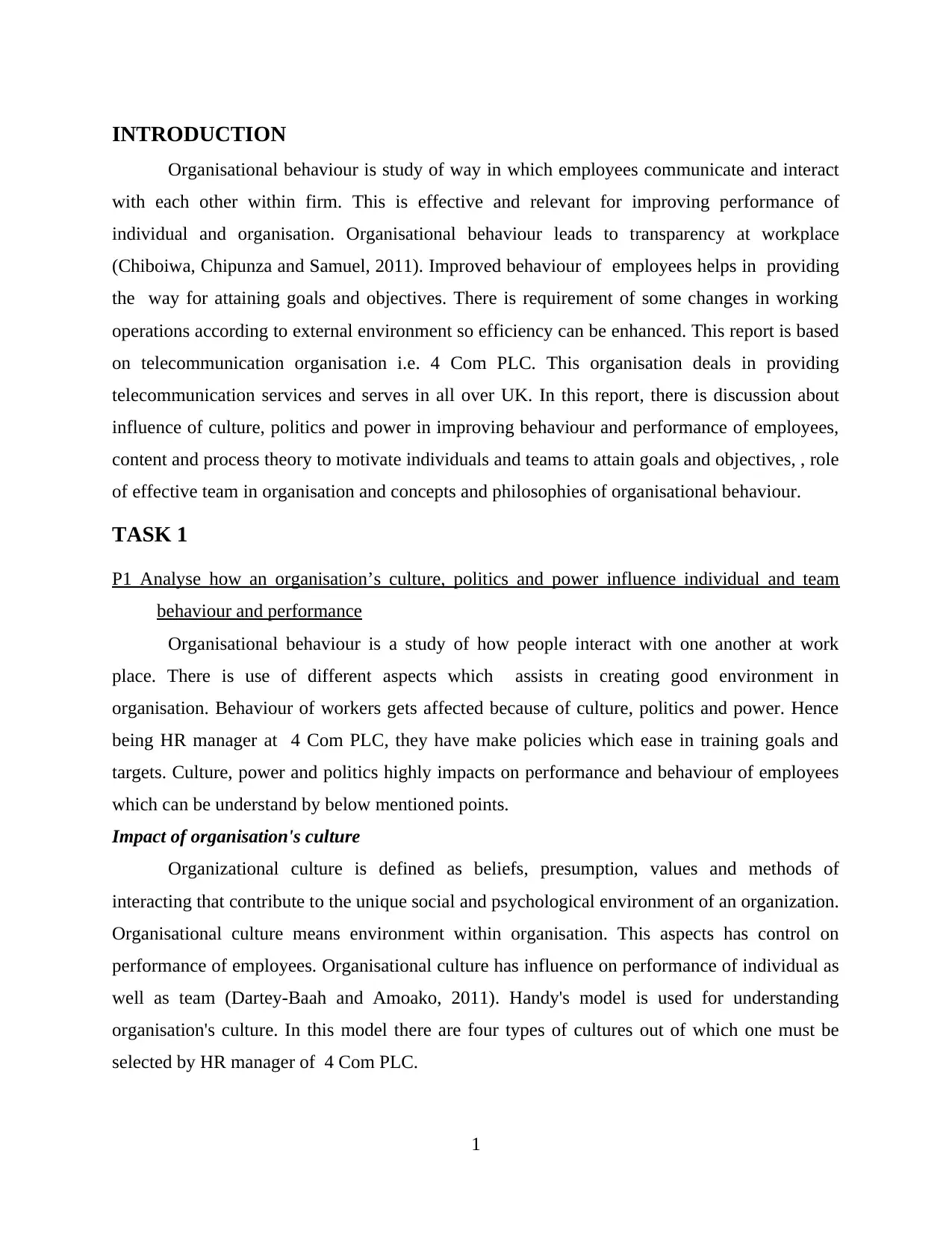
INTRODUCTION
Organisational behaviour is study of way in which employees communicate and interact
with each other within firm. This is effective and relevant for improving performance of
individual and organisation. Organisational behaviour leads to transparency at workplace
(Chiboiwa, Chipunza and Samuel, 2011). Improved behaviour of employees helps in providing
the way for attaining goals and objectives. There is requirement of some changes in working
operations according to external environment so efficiency can be enhanced. This report is based
on telecommunication organisation i.e. 4 Com PLC. This organisation deals in providing
telecommunication services and serves in all over UK. In this report, there is discussion about
influence of culture, politics and power in improving behaviour and performance of employees,
content and process theory to motivate individuals and teams to attain goals and objectives, , role
of effective team in organisation and concepts and philosophies of organisational behaviour.
TASK 1
P1 Analyse how an organisation’s culture, politics and power influence individual and team
behaviour and performance
Organisational behaviour is a study of how people interact with one another at work
place. There is use of different aspects which assists in creating good environment in
organisation. Behaviour of workers gets affected because of culture, politics and power. Hence
being HR manager at 4 Com PLC, they have make policies which ease in training goals and
targets. Culture, power and politics highly impacts on performance and behaviour of employees
which can be understand by below mentioned points.
Impact of organisation's culture
Organizational culture is defined as beliefs, presumption, values and methods of
interacting that contribute to the unique social and psychological environment of an organization.
Organisational culture means environment within organisation. This aspects has control on
performance of employees. Organisational culture has influence on performance of individual as
well as team (Dartey-Baah and Amoako, 2011). Handy's model is used for understanding
organisation's culture. In this model there are four types of cultures out of which one must be
selected by HR manager of 4 Com PLC.
1
Organisational behaviour is study of way in which employees communicate and interact
with each other within firm. This is effective and relevant for improving performance of
individual and organisation. Organisational behaviour leads to transparency at workplace
(Chiboiwa, Chipunza and Samuel, 2011). Improved behaviour of employees helps in providing
the way for attaining goals and objectives. There is requirement of some changes in working
operations according to external environment so efficiency can be enhanced. This report is based
on telecommunication organisation i.e. 4 Com PLC. This organisation deals in providing
telecommunication services and serves in all over UK. In this report, there is discussion about
influence of culture, politics and power in improving behaviour and performance of employees,
content and process theory to motivate individuals and teams to attain goals and objectives, , role
of effective team in organisation and concepts and philosophies of organisational behaviour.
TASK 1
P1 Analyse how an organisation’s culture, politics and power influence individual and team
behaviour and performance
Organisational behaviour is a study of how people interact with one another at work
place. There is use of different aspects which assists in creating good environment in
organisation. Behaviour of workers gets affected because of culture, politics and power. Hence
being HR manager at 4 Com PLC, they have make policies which ease in training goals and
targets. Culture, power and politics highly impacts on performance and behaviour of employees
which can be understand by below mentioned points.
Impact of organisation's culture
Organizational culture is defined as beliefs, presumption, values and methods of
interacting that contribute to the unique social and psychological environment of an organization.
Organisational culture means environment within organisation. This aspects has control on
performance of employees. Organisational culture has influence on performance of individual as
well as team (Dartey-Baah and Amoako, 2011). Handy's model is used for understanding
organisation's culture. In this model there are four types of cultures out of which one must be
selected by HR manager of 4 Com PLC.
1
Paraphrase This Document
Need a fresh take? Get an instant paraphrase of this document with our AI Paraphraser
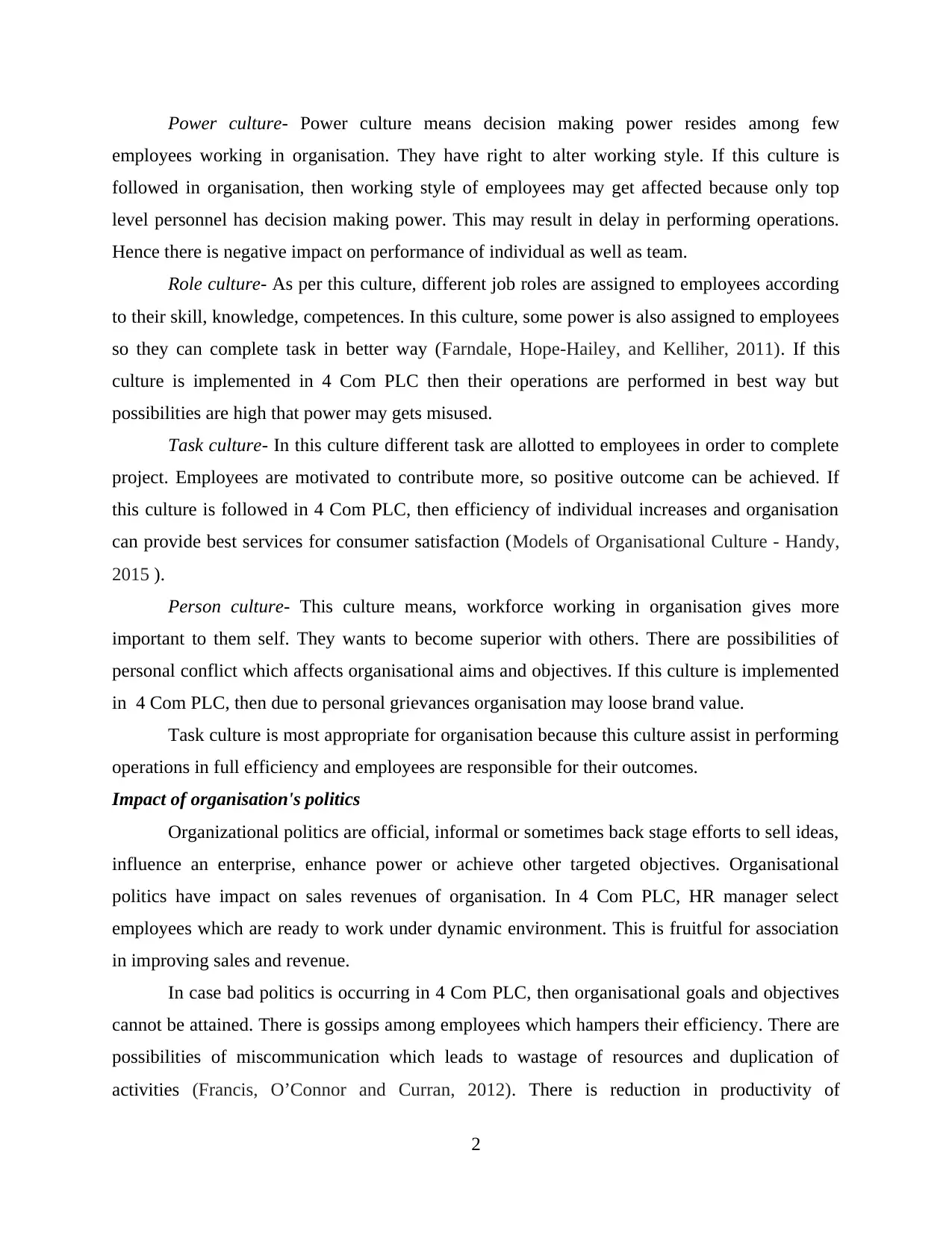
Power culture- Power culture means decision making power resides among few
employees working in organisation. They have right to alter working style. If this culture is
followed in organisation, then working style of employees may get affected because only top
level personnel has decision making power. This may result in delay in performing operations.
Hence there is negative impact on performance of individual as well as team.
Role culture- As per this culture, different job roles are assigned to employees according
to their skill, knowledge, competences. In this culture, some power is also assigned to employees
so they can complete task in better way (Farndale, Hope-Hailey, and Kelliher, 2011). If this
culture is implemented in 4 Com PLC then their operations are performed in best way but
possibilities are high that power may gets misused.
Task culture- In this culture different task are allotted to employees in order to complete
project. Employees are motivated to contribute more, so positive outcome can be achieved. If
this culture is followed in 4 Com PLC, then efficiency of individual increases and organisation
can provide best services for consumer satisfaction (Models of Organisational Culture - Handy,
2015 ).
Person culture- This culture means, workforce working in organisation gives more
important to them self. They wants to become superior with others. There are possibilities of
personal conflict which affects organisational aims and objectives. If this culture is implemented
in 4 Com PLC, then due to personal grievances organisation may loose brand value.
Task culture is most appropriate for organisation because this culture assist in performing
operations in full efficiency and employees are responsible for their outcomes.
Impact of organisation's politics
Organizational politics are official, informal or sometimes back stage efforts to sell ideas,
influence an enterprise, enhance power or achieve other targeted objectives. Organisational
politics have impact on sales revenues of organisation. In 4 Com PLC, HR manager select
employees which are ready to work under dynamic environment. This is fruitful for association
in improving sales and revenue.
In case bad politics is occurring in 4 Com PLC, then organisational goals and objectives
cannot be attained. There is gossips among employees which hampers their efficiency. There are
possibilities of miscommunication which leads to wastage of resources and duplication of
activities (Francis, O’Connor and Curran, 2012). There is reduction in productivity of
2
employees working in organisation. They have right to alter working style. If this culture is
followed in organisation, then working style of employees may get affected because only top
level personnel has decision making power. This may result in delay in performing operations.
Hence there is negative impact on performance of individual as well as team.
Role culture- As per this culture, different job roles are assigned to employees according
to their skill, knowledge, competences. In this culture, some power is also assigned to employees
so they can complete task in better way (Farndale, Hope-Hailey, and Kelliher, 2011). If this
culture is implemented in 4 Com PLC then their operations are performed in best way but
possibilities are high that power may gets misused.
Task culture- In this culture different task are allotted to employees in order to complete
project. Employees are motivated to contribute more, so positive outcome can be achieved. If
this culture is followed in 4 Com PLC, then efficiency of individual increases and organisation
can provide best services for consumer satisfaction (Models of Organisational Culture - Handy,
2015 ).
Person culture- This culture means, workforce working in organisation gives more
important to them self. They wants to become superior with others. There are possibilities of
personal conflict which affects organisational aims and objectives. If this culture is implemented
in 4 Com PLC, then due to personal grievances organisation may loose brand value.
Task culture is most appropriate for organisation because this culture assist in performing
operations in full efficiency and employees are responsible for their outcomes.
Impact of organisation's politics
Organizational politics are official, informal or sometimes back stage efforts to sell ideas,
influence an enterprise, enhance power or achieve other targeted objectives. Organisational
politics have impact on sales revenues of organisation. In 4 Com PLC, HR manager select
employees which are ready to work under dynamic environment. This is fruitful for association
in improving sales and revenue.
In case bad politics is occurring in 4 Com PLC, then organisational goals and objectives
cannot be attained. There is gossips among employees which hampers their efficiency. There are
possibilities of miscommunication which leads to wastage of resources and duplication of
activities (Francis, O’Connor and Curran, 2012). There is reduction in productivity of
2
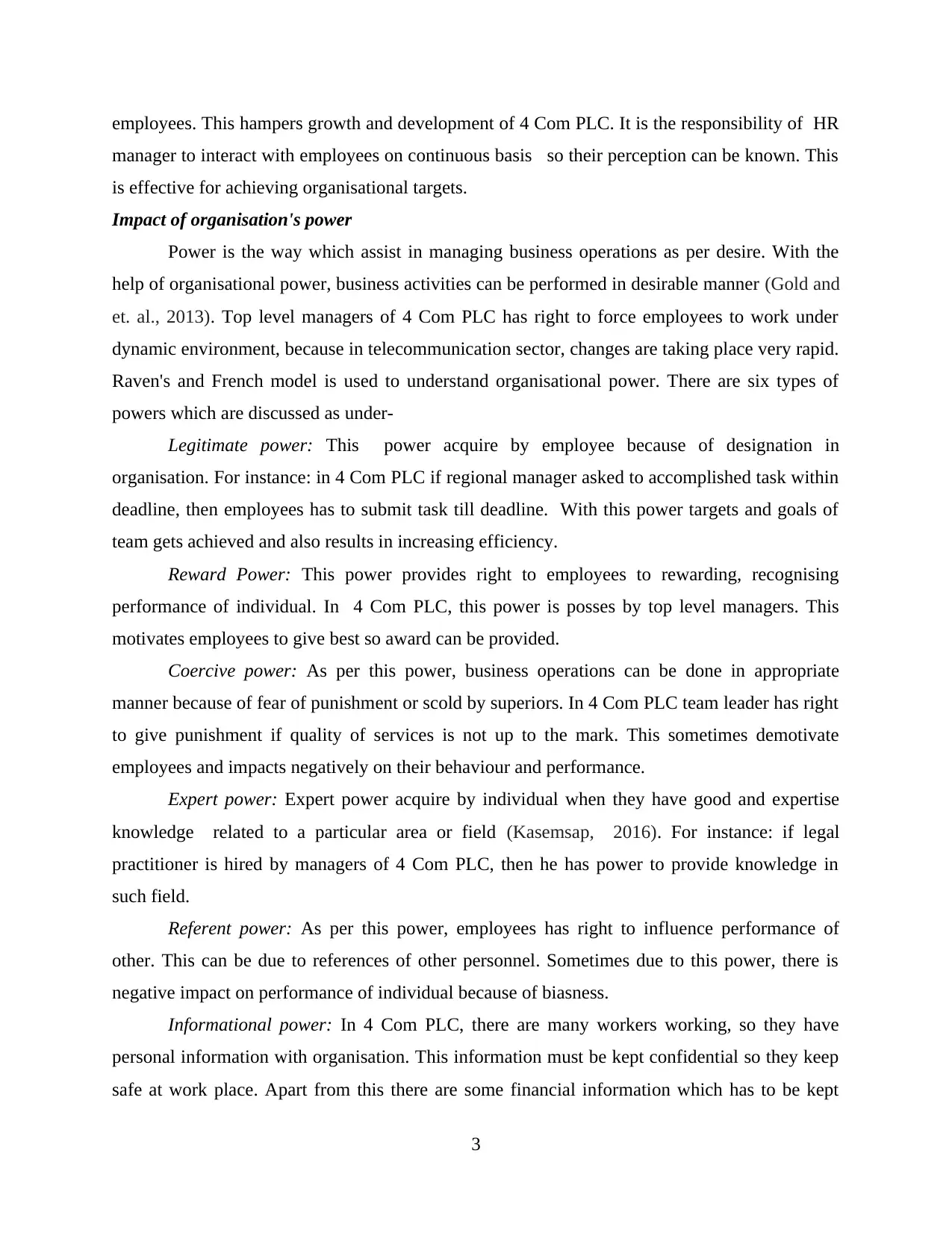
employees. This hampers growth and development of 4 Com PLC. It is the responsibility of HR
manager to interact with employees on continuous basis so their perception can be known. This
is effective for achieving organisational targets.
Impact of organisation's power
Power is the way which assist in managing business operations as per desire. With the
help of organisational power, business activities can be performed in desirable manner (Gold and
et. al., 2013). Top level managers of 4 Com PLC has right to force employees to work under
dynamic environment, because in telecommunication sector, changes are taking place very rapid.
Raven's and French model is used to understand organisational power. There are six types of
powers which are discussed as under-
Legitimate power: This power acquire by employee because of designation in
organisation. For instance: in 4 Com PLC if regional manager asked to accomplished task within
deadline, then employees has to submit task till deadline. With this power targets and goals of
team gets achieved and also results in increasing efficiency.
Reward Power: This power provides right to employees to rewarding, recognising
performance of individual. In 4 Com PLC, this power is posses by top level managers. This
motivates employees to give best so award can be provided.
Coercive power: As per this power, business operations can be done in appropriate
manner because of fear of punishment or scold by superiors. In 4 Com PLC team leader has right
to give punishment if quality of services is not up to the mark. This sometimes demotivate
employees and impacts negatively on their behaviour and performance.
Expert power: Expert power acquire by individual when they have good and expertise
knowledge related to a particular area or field (Kasemsap, 2016). For instance: if legal
practitioner is hired by managers of 4 Com PLC, then he has power to provide knowledge in
such field.
Referent power: As per this power, employees has right to influence performance of
other. This can be due to references of other personnel. Sometimes due to this power, there is
negative impact on performance of individual because of biasness.
Informational power: In 4 Com PLC, there are many workers working, so they have
personal information with organisation. This information must be kept confidential so they keep
safe at work place. Apart from this there are some financial information which has to be kept
3
manager to interact with employees on continuous basis so their perception can be known. This
is effective for achieving organisational targets.
Impact of organisation's power
Power is the way which assist in managing business operations as per desire. With the
help of organisational power, business activities can be performed in desirable manner (Gold and
et. al., 2013). Top level managers of 4 Com PLC has right to force employees to work under
dynamic environment, because in telecommunication sector, changes are taking place very rapid.
Raven's and French model is used to understand organisational power. There are six types of
powers which are discussed as under-
Legitimate power: This power acquire by employee because of designation in
organisation. For instance: in 4 Com PLC if regional manager asked to accomplished task within
deadline, then employees has to submit task till deadline. With this power targets and goals of
team gets achieved and also results in increasing efficiency.
Reward Power: This power provides right to employees to rewarding, recognising
performance of individual. In 4 Com PLC, this power is posses by top level managers. This
motivates employees to give best so award can be provided.
Coercive power: As per this power, business operations can be done in appropriate
manner because of fear of punishment or scold by superiors. In 4 Com PLC team leader has right
to give punishment if quality of services is not up to the mark. This sometimes demotivate
employees and impacts negatively on their behaviour and performance.
Expert power: Expert power acquire by individual when they have good and expertise
knowledge related to a particular area or field (Kasemsap, 2016). For instance: if legal
practitioner is hired by managers of 4 Com PLC, then he has power to provide knowledge in
such field.
Referent power: As per this power, employees has right to influence performance of
other. This can be due to references of other personnel. Sometimes due to this power, there is
negative impact on performance of individual because of biasness.
Informational power: In 4 Com PLC, there are many workers working, so they have
personal information with organisation. This information must be kept confidential so they keep
safe at work place. Apart from this there are some financial information which has to be kept
3
⊘ This is a preview!⊘
Do you want full access?
Subscribe today to unlock all pages.

Trusted by 1+ million students worldwide
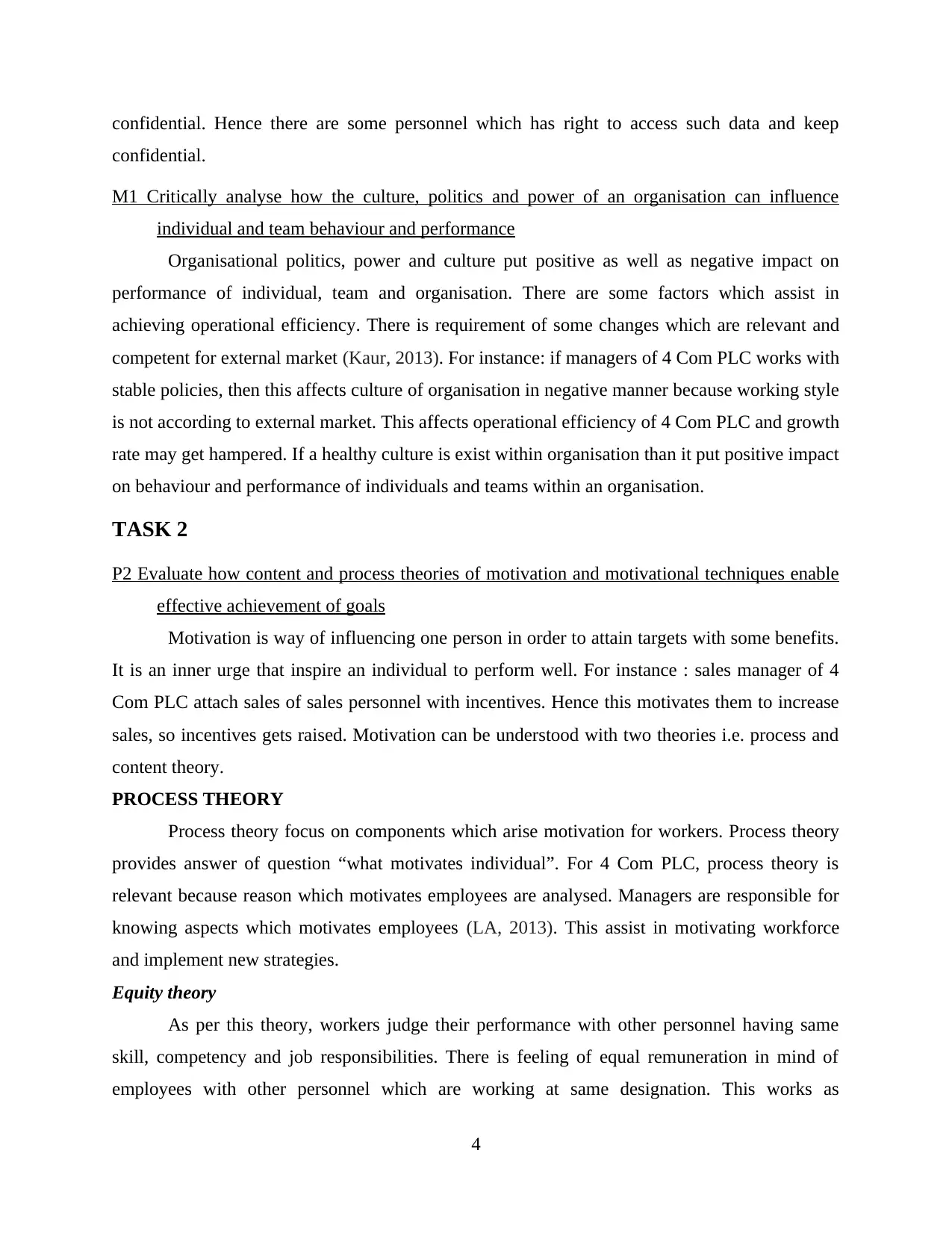
confidential. Hence there are some personnel which has right to access such data and keep
confidential.
M1 Critically analyse how the culture, politics and power of an organisation can influence
individual and team behaviour and performance
Organisational politics, power and culture put positive as well as negative impact on
performance of individual, team and organisation. There are some factors which assist in
achieving operational efficiency. There is requirement of some changes which are relevant and
competent for external market (Kaur, 2013). For instance: if managers of 4 Com PLC works with
stable policies, then this affects culture of organisation in negative manner because working style
is not according to external market. This affects operational efficiency of 4 Com PLC and growth
rate may get hampered. If a healthy culture is exist within organisation than it put positive impact
on behaviour and performance of individuals and teams within an organisation.
TASK 2
P2 Evaluate how content and process theories of motivation and motivational techniques enable
effective achievement of goals
Motivation is way of influencing one person in order to attain targets with some benefits.
It is an inner urge that inspire an individual to perform well. For instance : sales manager of 4
Com PLC attach sales of sales personnel with incentives. Hence this motivates them to increase
sales, so incentives gets raised. Motivation can be understood with two theories i.e. process and
content theory.
PROCESS THEORY
Process theory focus on components which arise motivation for workers. Process theory
provides answer of question “what motivates individual”. For 4 Com PLC, process theory is
relevant because reason which motivates employees are analysed. Managers are responsible for
knowing aspects which motivates employees (LA, 2013). This assist in motivating workforce
and implement new strategies.
Equity theory
As per this theory, workers judge their performance with other personnel having same
skill, competency and job responsibilities. There is feeling of equal remuneration in mind of
employees with other personnel which are working at same designation. This works as
4
confidential.
M1 Critically analyse how the culture, politics and power of an organisation can influence
individual and team behaviour and performance
Organisational politics, power and culture put positive as well as negative impact on
performance of individual, team and organisation. There are some factors which assist in
achieving operational efficiency. There is requirement of some changes which are relevant and
competent for external market (Kaur, 2013). For instance: if managers of 4 Com PLC works with
stable policies, then this affects culture of organisation in negative manner because working style
is not according to external market. This affects operational efficiency of 4 Com PLC and growth
rate may get hampered. If a healthy culture is exist within organisation than it put positive impact
on behaviour and performance of individuals and teams within an organisation.
TASK 2
P2 Evaluate how content and process theories of motivation and motivational techniques enable
effective achievement of goals
Motivation is way of influencing one person in order to attain targets with some benefits.
It is an inner urge that inspire an individual to perform well. For instance : sales manager of 4
Com PLC attach sales of sales personnel with incentives. Hence this motivates them to increase
sales, so incentives gets raised. Motivation can be understood with two theories i.e. process and
content theory.
PROCESS THEORY
Process theory focus on components which arise motivation for workers. Process theory
provides answer of question “what motivates individual”. For 4 Com PLC, process theory is
relevant because reason which motivates employees are analysed. Managers are responsible for
knowing aspects which motivates employees (LA, 2013). This assist in motivating workforce
and implement new strategies.
Equity theory
As per this theory, workers judge their performance with other personnel having same
skill, competency and job responsibilities. There is feeling of equal remuneration in mind of
employees with other personnel which are working at same designation. This works as
4
Paraphrase This Document
Need a fresh take? Get an instant paraphrase of this document with our AI Paraphraser
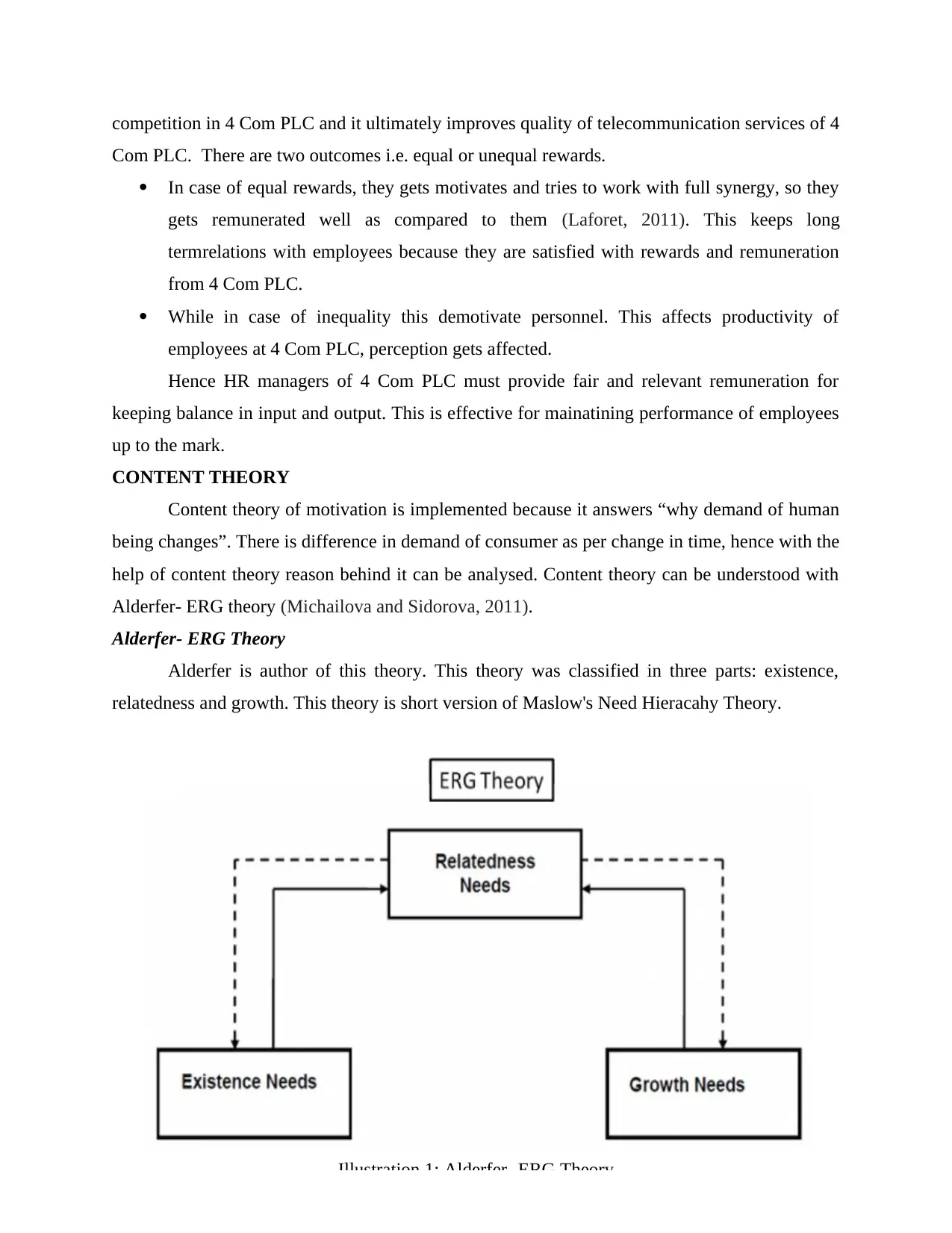
competition in 4 Com PLC and it ultimately improves quality of telecommunication services of 4
Com PLC. There are two outcomes i.e. equal or unequal rewards.
In case of equal rewards, they gets motivates and tries to work with full synergy, so they
gets remunerated well as compared to them (Laforet, 2011). This keeps long
termrelations with employees because they are satisfied with rewards and remuneration
from 4 Com PLC.
While in case of inequality this demotivate personnel. This affects productivity of
employees at 4 Com PLC, perception gets affected.
Hence HR managers of 4 Com PLC must provide fair and relevant remuneration for
keeping balance in input and output. This is effective for mainatining performance of employees
up to the mark.
CONTENT THEORY
Content theory of motivation is implemented because it answers “why demand of human
being changes”. There is difference in demand of consumer as per change in time, hence with the
help of content theory reason behind it can be analysed. Content theory can be understood with
Alderfer- ERG theory (Michailova and Sidorova, 2011).
Alderfer- ERG Theory
Alderfer is author of this theory. This theory was classified in three parts: existence,
relatedness and growth. This theory is short version of Maslow's Need Hieracahy Theory.
5
Illustration 1: Alderfer- ERG Theory
Com PLC. There are two outcomes i.e. equal or unequal rewards.
In case of equal rewards, they gets motivates and tries to work with full synergy, so they
gets remunerated well as compared to them (Laforet, 2011). This keeps long
termrelations with employees because they are satisfied with rewards and remuneration
from 4 Com PLC.
While in case of inequality this demotivate personnel. This affects productivity of
employees at 4 Com PLC, perception gets affected.
Hence HR managers of 4 Com PLC must provide fair and relevant remuneration for
keeping balance in input and output. This is effective for mainatining performance of employees
up to the mark.
CONTENT THEORY
Content theory of motivation is implemented because it answers “why demand of human
being changes”. There is difference in demand of consumer as per change in time, hence with the
help of content theory reason behind it can be analysed. Content theory can be understood with
Alderfer- ERG theory (Michailova and Sidorova, 2011).
Alderfer- ERG Theory
Alderfer is author of this theory. This theory was classified in three parts: existence,
relatedness and growth. This theory is short version of Maslow's Need Hieracahy Theory.
5
Illustration 1: Alderfer- ERG Theory
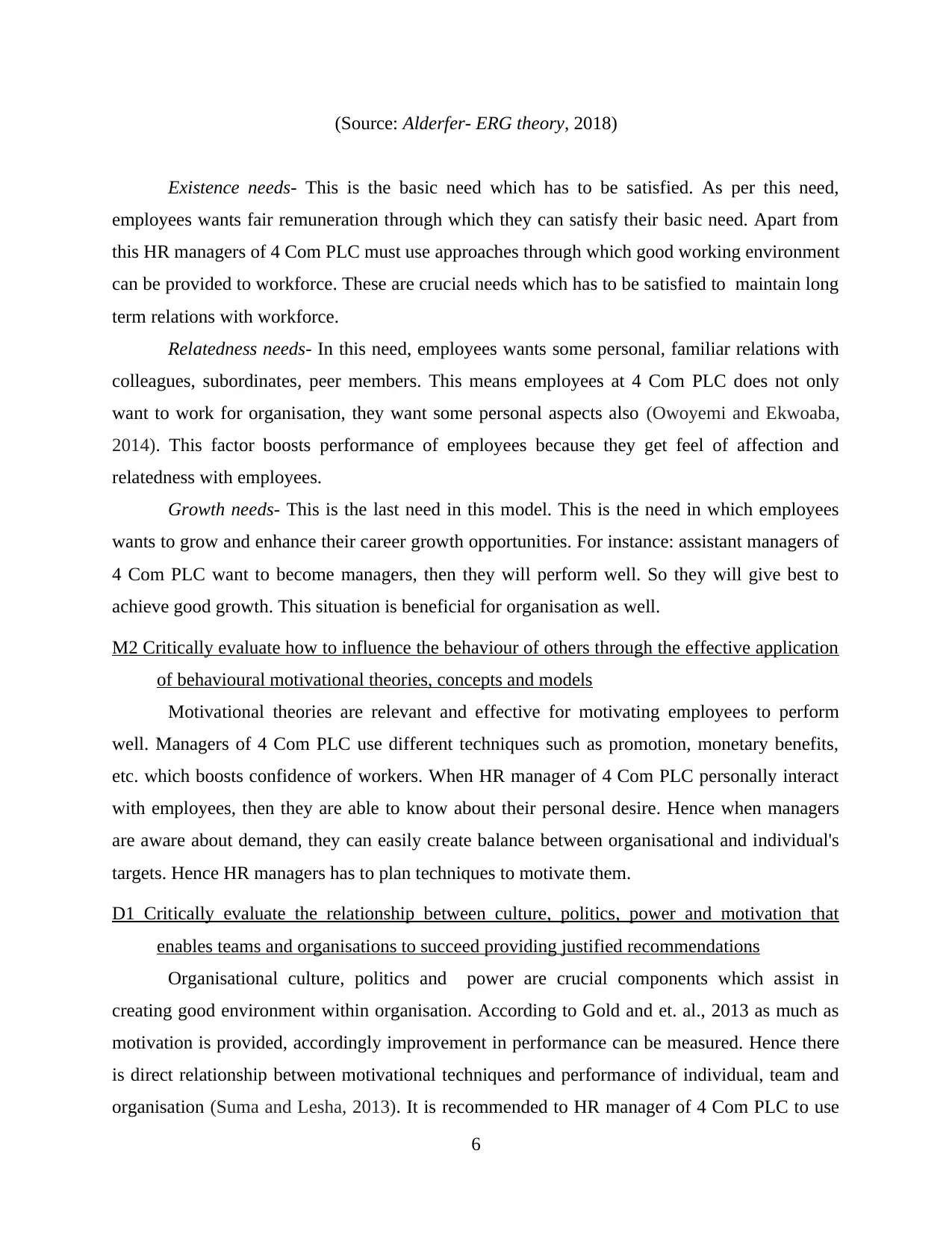
(Source: Alderfer- ERG theory, 2018)
Existence needs- This is the basic need which has to be satisfied. As per this need,
employees wants fair remuneration through which they can satisfy their basic need. Apart from
this HR managers of 4 Com PLC must use approaches through which good working environment
can be provided to workforce. These are crucial needs which has to be satisfied to maintain long
term relations with workforce.
Relatedness needs- In this need, employees wants some personal, familiar relations with
colleagues, subordinates, peer members. This means employees at 4 Com PLC does not only
want to work for organisation, they want some personal aspects also (Owoyemi and Ekwoaba,
2014). This factor boosts performance of employees because they get feel of affection and
relatedness with employees.
Growth needs- This is the last need in this model. This is the need in which employees
wants to grow and enhance their career growth opportunities. For instance: assistant managers of
4 Com PLC want to become managers, then they will perform well. So they will give best to
achieve good growth. This situation is beneficial for organisation as well.
M2 Critically evaluate how to influence the behaviour of others through the effective application
of behavioural motivational theories, concepts and models
Motivational theories are relevant and effective for motivating employees to perform
well. Managers of 4 Com PLC use different techniques such as promotion, monetary benefits,
etc. which boosts confidence of workers. When HR manager of 4 Com PLC personally interact
with employees, then they are able to know about their personal desire. Hence when managers
are aware about demand, they can easily create balance between organisational and individual's
targets. Hence HR managers has to plan techniques to motivate them.
D1 Critically evaluate the relationship between culture, politics, power and motivation that
enables teams and organisations to succeed providing justified recommendations
Organisational culture, politics and power are crucial components which assist in
creating good environment within organisation. According to Gold and et. al., 2013 as much as
motivation is provided, accordingly improvement in performance can be measured. Hence there
is direct relationship between motivational techniques and performance of individual, team and
organisation (Suma and Lesha, 2013). It is recommended to HR manager of 4 Com PLC to use
6
Existence needs- This is the basic need which has to be satisfied. As per this need,
employees wants fair remuneration through which they can satisfy their basic need. Apart from
this HR managers of 4 Com PLC must use approaches through which good working environment
can be provided to workforce. These are crucial needs which has to be satisfied to maintain long
term relations with workforce.
Relatedness needs- In this need, employees wants some personal, familiar relations with
colleagues, subordinates, peer members. This means employees at 4 Com PLC does not only
want to work for organisation, they want some personal aspects also (Owoyemi and Ekwoaba,
2014). This factor boosts performance of employees because they get feel of affection and
relatedness with employees.
Growth needs- This is the last need in this model. This is the need in which employees
wants to grow and enhance their career growth opportunities. For instance: assistant managers of
4 Com PLC want to become managers, then they will perform well. So they will give best to
achieve good growth. This situation is beneficial for organisation as well.
M2 Critically evaluate how to influence the behaviour of others through the effective application
of behavioural motivational theories, concepts and models
Motivational theories are relevant and effective for motivating employees to perform
well. Managers of 4 Com PLC use different techniques such as promotion, monetary benefits,
etc. which boosts confidence of workers. When HR manager of 4 Com PLC personally interact
with employees, then they are able to know about their personal desire. Hence when managers
are aware about demand, they can easily create balance between organisational and individual's
targets. Hence HR managers has to plan techniques to motivate them.
D1 Critically evaluate the relationship between culture, politics, power and motivation that
enables teams and organisations to succeed providing justified recommendations
Organisational culture, politics and power are crucial components which assist in
creating good environment within organisation. According to Gold and et. al., 2013 as much as
motivation is provided, accordingly improvement in performance can be measured. Hence there
is direct relationship between motivational techniques and performance of individual, team and
organisation (Suma and Lesha, 2013). It is recommended to HR manager of 4 Com PLC to use
6
⊘ This is a preview!⊘
Do you want full access?
Subscribe today to unlock all pages.

Trusted by 1+ million students worldwide
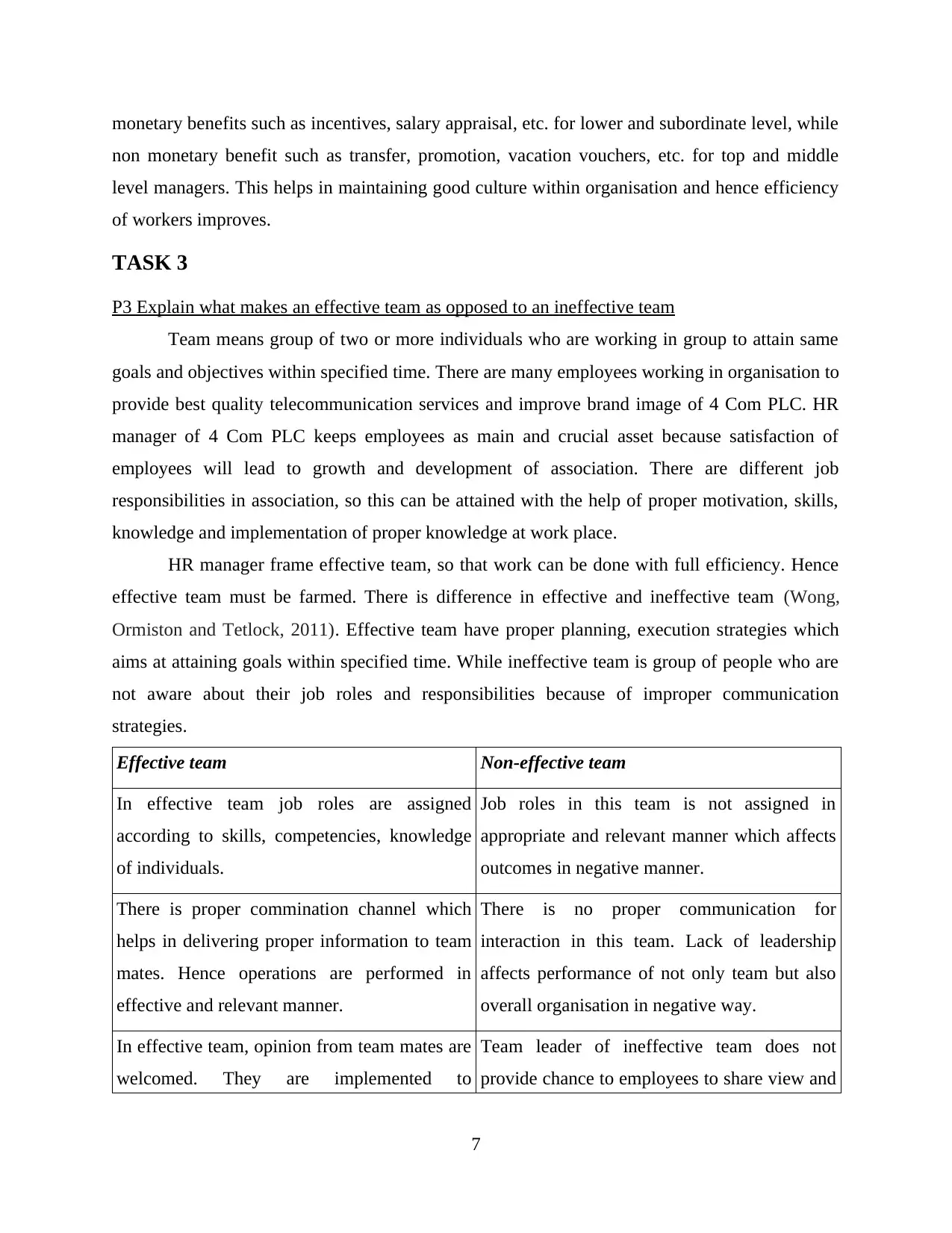
monetary benefits such as incentives, salary appraisal, etc. for lower and subordinate level, while
non monetary benefit such as transfer, promotion, vacation vouchers, etc. for top and middle
level managers. This helps in maintaining good culture within organisation and hence efficiency
of workers improves.
TASK 3
P3 Explain what makes an effective team as opposed to an ineffective team
Team means group of two or more individuals who are working in group to attain same
goals and objectives within specified time. There are many employees working in organisation to
provide best quality telecommunication services and improve brand image of 4 Com PLC. HR
manager of 4 Com PLC keeps employees as main and crucial asset because satisfaction of
employees will lead to growth and development of association. There are different job
responsibilities in association, so this can be attained with the help of proper motivation, skills,
knowledge and implementation of proper knowledge at work place.
HR manager frame effective team, so that work can be done with full efficiency. Hence
effective team must be farmed. There is difference in effective and ineffective team (Wong,
Ormiston and Tetlock, 2011). Effective team have proper planning, execution strategies which
aims at attaining goals within specified time. While ineffective team is group of people who are
not aware about their job roles and responsibilities because of improper communication
strategies.
Effective team Non-effective team
In effective team job roles are assigned
according to skills, competencies, knowledge
of individuals.
Job roles in this team is not assigned in
appropriate and relevant manner which affects
outcomes in negative manner.
There is proper commination channel which
helps in delivering proper information to team
mates. Hence operations are performed in
effective and relevant manner.
There is no proper communication for
interaction in this team. Lack of leadership
affects performance of not only team but also
overall organisation in negative way.
In effective team, opinion from team mates are
welcomed. They are implemented to
Team leader of ineffective team does not
provide chance to employees to share view and
7
non monetary benefit such as transfer, promotion, vacation vouchers, etc. for top and middle
level managers. This helps in maintaining good culture within organisation and hence efficiency
of workers improves.
TASK 3
P3 Explain what makes an effective team as opposed to an ineffective team
Team means group of two or more individuals who are working in group to attain same
goals and objectives within specified time. There are many employees working in organisation to
provide best quality telecommunication services and improve brand image of 4 Com PLC. HR
manager of 4 Com PLC keeps employees as main and crucial asset because satisfaction of
employees will lead to growth and development of association. There are different job
responsibilities in association, so this can be attained with the help of proper motivation, skills,
knowledge and implementation of proper knowledge at work place.
HR manager frame effective team, so that work can be done with full efficiency. Hence
effective team must be farmed. There is difference in effective and ineffective team (Wong,
Ormiston and Tetlock, 2011). Effective team have proper planning, execution strategies which
aims at attaining goals within specified time. While ineffective team is group of people who are
not aware about their job roles and responsibilities because of improper communication
strategies.
Effective team Non-effective team
In effective team job roles are assigned
according to skills, competencies, knowledge
of individuals.
Job roles in this team is not assigned in
appropriate and relevant manner which affects
outcomes in negative manner.
There is proper commination channel which
helps in delivering proper information to team
mates. Hence operations are performed in
effective and relevant manner.
There is no proper communication for
interaction in this team. Lack of leadership
affects performance of not only team but also
overall organisation in negative way.
In effective team, opinion from team mates are
welcomed. They are implemented to
Team leader of ineffective team does not
provide chance to employees to share view and
7
Paraphrase This Document
Need a fresh take? Get an instant paraphrase of this document with our AI Paraphraser
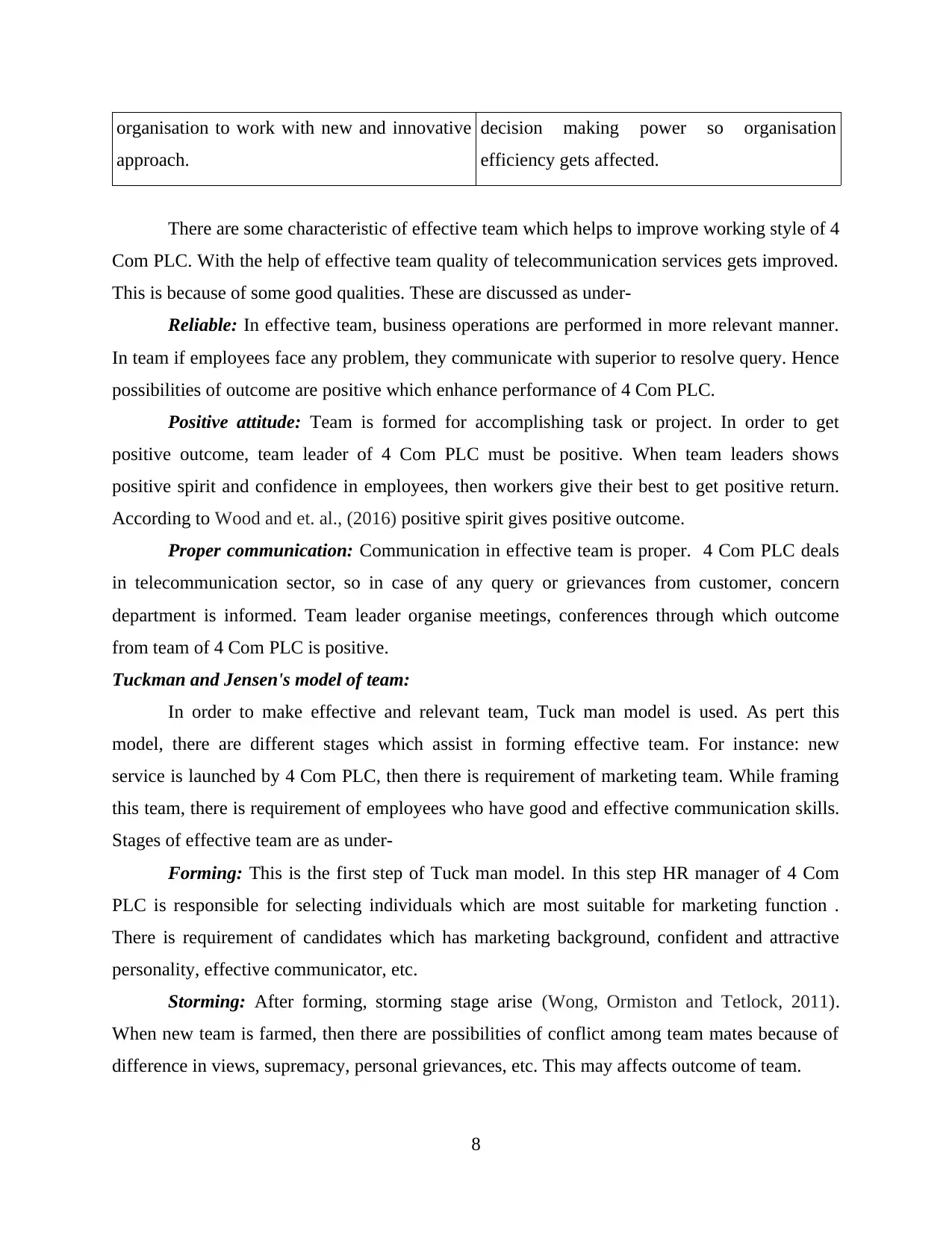
organisation to work with new and innovative
approach.
decision making power so organisation
efficiency gets affected.
There are some characteristic of effective team which helps to improve working style of 4
Com PLC. With the help of effective team quality of telecommunication services gets improved.
This is because of some good qualities. These are discussed as under-
Reliable: In effective team, business operations are performed in more relevant manner.
In team if employees face any problem, they communicate with superior to resolve query. Hence
possibilities of outcome are positive which enhance performance of 4 Com PLC.
Positive attitude: Team is formed for accomplishing task or project. In order to get
positive outcome, team leader of 4 Com PLC must be positive. When team leaders shows
positive spirit and confidence in employees, then workers give their best to get positive return.
According to Wood and et. al., (2016) positive spirit gives positive outcome.
Proper communication: Communication in effective team is proper. 4 Com PLC deals
in telecommunication sector, so in case of any query or grievances from customer, concern
department is informed. Team leader organise meetings, conferences through which outcome
from team of 4 Com PLC is positive.
Tuckman and Jensen's model of team:
In order to make effective and relevant team, Tuck man model is used. As pert this
model, there are different stages which assist in forming effective team. For instance: new
service is launched by 4 Com PLC, then there is requirement of marketing team. While framing
this team, there is requirement of employees who have good and effective communication skills.
Stages of effective team are as under-
Forming: This is the first step of Tuck man model. In this step HR manager of 4 Com
PLC is responsible for selecting individuals which are most suitable for marketing function .
There is requirement of candidates which has marketing background, confident and attractive
personality, effective communicator, etc.
Storming: After forming, storming stage arise (Wong, Ormiston and Tetlock, 2011).
When new team is farmed, then there are possibilities of conflict among team mates because of
difference in views, supremacy, personal grievances, etc. This may affects outcome of team.
8
approach.
decision making power so organisation
efficiency gets affected.
There are some characteristic of effective team which helps to improve working style of 4
Com PLC. With the help of effective team quality of telecommunication services gets improved.
This is because of some good qualities. These are discussed as under-
Reliable: In effective team, business operations are performed in more relevant manner.
In team if employees face any problem, they communicate with superior to resolve query. Hence
possibilities of outcome are positive which enhance performance of 4 Com PLC.
Positive attitude: Team is formed for accomplishing task or project. In order to get
positive outcome, team leader of 4 Com PLC must be positive. When team leaders shows
positive spirit and confidence in employees, then workers give their best to get positive return.
According to Wood and et. al., (2016) positive spirit gives positive outcome.
Proper communication: Communication in effective team is proper. 4 Com PLC deals
in telecommunication sector, so in case of any query or grievances from customer, concern
department is informed. Team leader organise meetings, conferences through which outcome
from team of 4 Com PLC is positive.
Tuckman and Jensen's model of team:
In order to make effective and relevant team, Tuck man model is used. As pert this
model, there are different stages which assist in forming effective team. For instance: new
service is launched by 4 Com PLC, then there is requirement of marketing team. While framing
this team, there is requirement of employees who have good and effective communication skills.
Stages of effective team are as under-
Forming: This is the first step of Tuck man model. In this step HR manager of 4 Com
PLC is responsible for selecting individuals which are most suitable for marketing function .
There is requirement of candidates which has marketing background, confident and attractive
personality, effective communicator, etc.
Storming: After forming, storming stage arise (Wong, Ormiston and Tetlock, 2011).
When new team is farmed, then there are possibilities of conflict among team mates because of
difference in views, supremacy, personal grievances, etc. This may affects outcome of team.
8
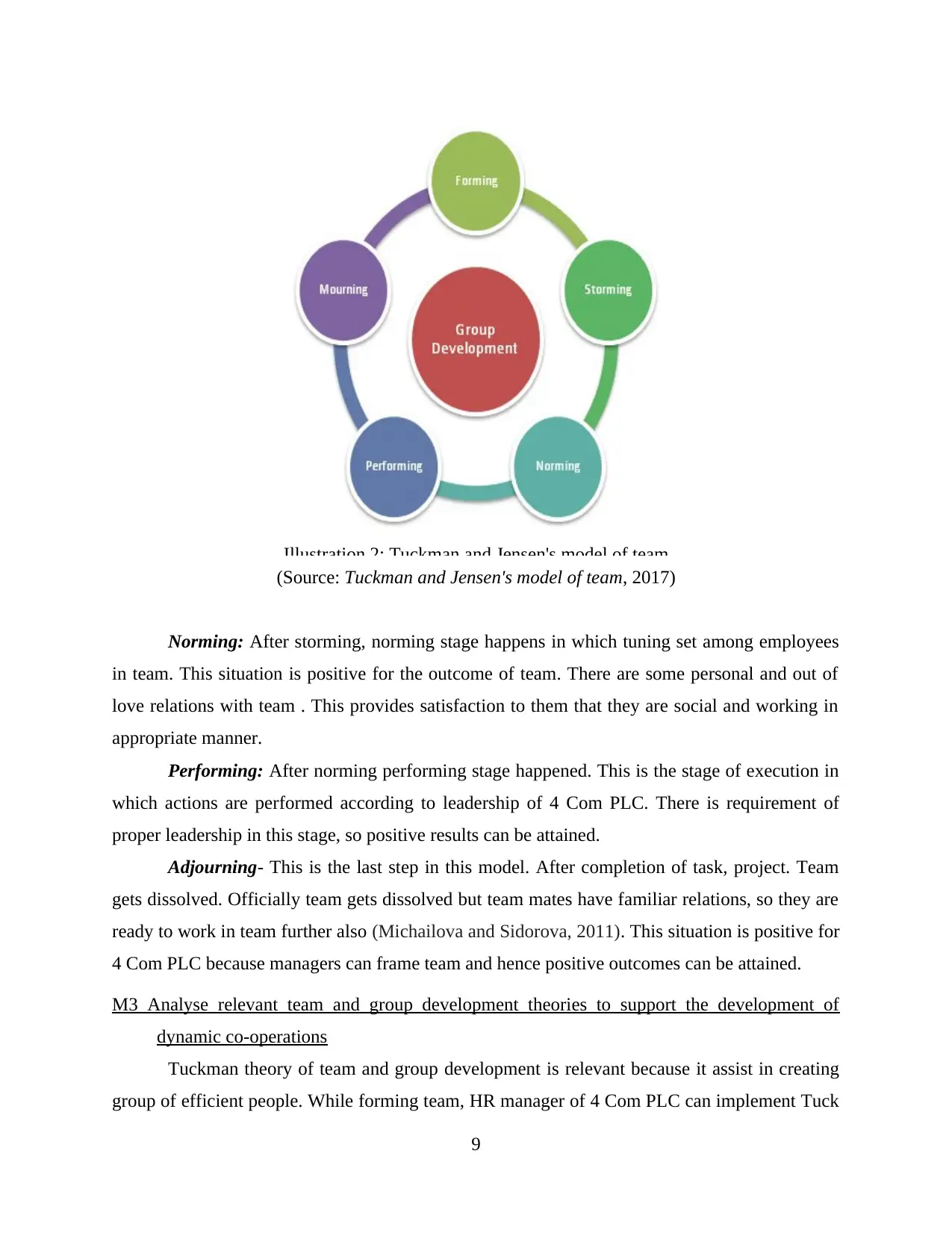
(Source: Tuckman and Jensen's model of team, 2017)
Norming: After storming, norming stage happens in which tuning set among employees
in team. This situation is positive for the outcome of team. There are some personal and out of
love relations with team . This provides satisfaction to them that they are social and working in
appropriate manner.
Performing: After norming performing stage happened. This is the stage of execution in
which actions are performed according to leadership of 4 Com PLC. There is requirement of
proper leadership in this stage, so positive results can be attained.
Adjourning- This is the last step in this model. After completion of task, project. Team
gets dissolved. Officially team gets dissolved but team mates have familiar relations, so they are
ready to work in team further also (Michailova and Sidorova, 2011). This situation is positive for
4 Com PLC because managers can frame team and hence positive outcomes can be attained.
M3 Analyse relevant team and group development theories to support the development of
dynamic co-operations
Tuckman theory of team and group development is relevant because it assist in creating
group of efficient people. While forming team, HR manager of 4 Com PLC can implement Tuck
9
Illustration 2: Tuckman and Jensen's model of team
Norming: After storming, norming stage happens in which tuning set among employees
in team. This situation is positive for the outcome of team. There are some personal and out of
love relations with team . This provides satisfaction to them that they are social and working in
appropriate manner.
Performing: After norming performing stage happened. This is the stage of execution in
which actions are performed according to leadership of 4 Com PLC. There is requirement of
proper leadership in this stage, so positive results can be attained.
Adjourning- This is the last step in this model. After completion of task, project. Team
gets dissolved. Officially team gets dissolved but team mates have familiar relations, so they are
ready to work in team further also (Michailova and Sidorova, 2011). This situation is positive for
4 Com PLC because managers can frame team and hence positive outcomes can be attained.
M3 Analyse relevant team and group development theories to support the development of
dynamic co-operations
Tuckman theory of team and group development is relevant because it assist in creating
group of efficient people. While forming team, HR manager of 4 Com PLC can implement Tuck
9
Illustration 2: Tuckman and Jensen's model of team
⊘ This is a preview!⊘
Do you want full access?
Subscribe today to unlock all pages.

Trusted by 1+ million students worldwide
1 out of 16
Related Documents
Your All-in-One AI-Powered Toolkit for Academic Success.
+13062052269
info@desklib.com
Available 24*7 on WhatsApp / Email
![[object Object]](/_next/static/media/star-bottom.7253800d.svg)
Unlock your academic potential
Copyright © 2020–2026 A2Z Services. All Rights Reserved. Developed and managed by ZUCOL.




